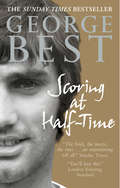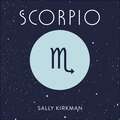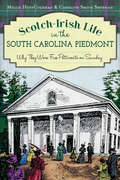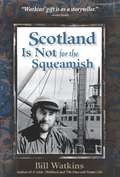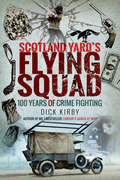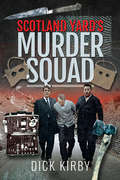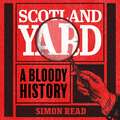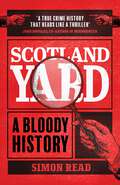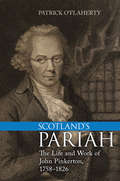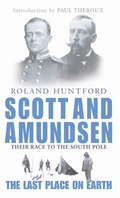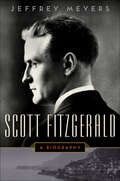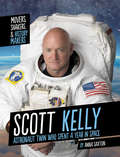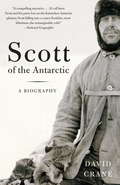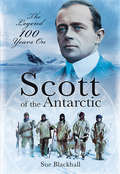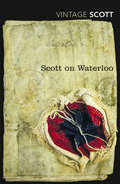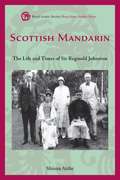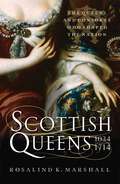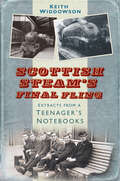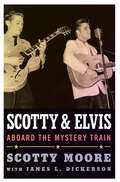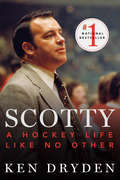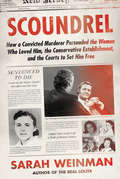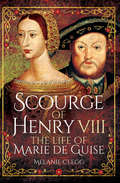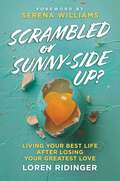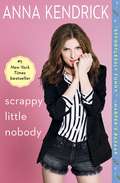- Table View
- List View
Scoring At Half-Time: Adventures On and Off the Pitch
by George BestMichael Parkinson: 'What was the nearest to kick-off that you made love to a woman?'George Best: 'Er- I think it was half-time actually'George Best was the first celebrity footballer and to many the greatest British player ever. In Scoring at Half-Time he gathers together his favourite memories, stories and anecdotes from his experiences in and out of the game over the last forty years. No dressing room door is left unopened, no player's bar tale untold and no secret kept in this fond, humorous look at football's golden era from the man who was usually there when it happened. Inside stories and lurid tales about George, Bobby, Denis, Nobby and Fergie amongst others. Scoring at Half-Time will delight anyone who has ever wanted to spend time in the company of the footballing legend.
Scorpio: The Art of Living Well and Finding Happiness According to Your Star Sign
by Sally KirkmanYou are a Scorpio. You are the change agent and healer of the zodiac.The signs of the zodiac can give us great insight into our day-to-day living as well as the many talents and qualities we possess. But in an increasingly unpredictable world, how can we make sense of them? And what do they mean? This insightful and introductory guide delves deep into your star sign, revealing unique traits and meanings which you didn't know. Along the way, you will discover how your sign defies your compatibility, how to improve your health and what your gifts are. ***The Pocket Astrology series will teach you how to live well and enhance every aspect of your life. From friendship to compatibility, careers to finance, you will discover new elements to your sign and learn about the ancient art of astrology. Other audiobooks in the series include: Aries, Taurus, Gemini, Cancer, Leo, Virgo, Libra, Scorpio, Sagittarius,Capricorn, Aquarius, Pisces(P)2018 Hodder & Stoughton Limited
Scotch-Irish Life in the South Carolina Piedmont: Why They Wore Five Petticoats on Sunday
by Millie Huff Coleman Caroline Smith Sherman"Five Petticoats on Sunday" was originally published in 1962. The book was a collection of columns written by Caroline S. Coleman containing stories her grandmother told about the Fairview community and the South Carolina Piedmont. Coleman's granddaughters, Millie Coleman and Caroline Sherman, have expanded the book with recipes, history and genealogical resources for an enthralling look at the lives of Scotch-Irish residents in the area from Reconstruction until the 1900s. Find out why most homes in the area had a Prophet's Room. Sit with the children as they wait for the "second table" during visiting season and learn exactly why they wore five petticoats on Sunday. Sherman and Coleman examine a time and lifestyle far away from today's modern conveniences but complete with warmth of family.
Scotland Is Not for the Squeamish
by Bill WatkinsContinuing from where A Celtic Childhood left off, Scotland Is Not for the Squeamish reflects on the events that transpired through Bill's early twenties and shaped him as a man. After realizing his childhood dream of becoming a wireless operator at seas, Watkins narrates his amazing predicaments. Whether it's a hurricane on a trawler, sinking docked warships, or hunting for gold in the mountains of Scotland, the tales of the ever-vibrant Bill Watkins capture his adventures with glorious effect.
Scotland Yard's Flying Squad: 100 Years of Crime Fighting
by Dick KirbyA history of the famed London police unit, by a former member and author who &“knows how to bring his coppers to life on each page&” (Joseph Wambaugh, New York Times–bestselling author of The Onion Field). Since 1919, Scotland Yard&’s Flying Squad has been in the forefront of the war against crime. From patrolling London&’s streets in horse-drawn wagons, it has progressed to the use of the most sophisticated surveillance and crime-fighting equipment. The Squad targeted protection gangs who infested British racecourses and greyhound tracks, and later the highly effective Ghost Squad was formed to tackle black-marketeering in the aftermath of the Second World War. As crime soared in the 1950s and &’60s the Flying Squad, or C8 Department as it was now known, became involved in the most serious cases nationwide—The Great Train Robbery, the Brink&’s-Mat robbery, The Millennium Dome and Hatton Garden heists. Today the ruthless drug and people trafficking gangs that seek rich pickings in London and elsewhere are in their sights. Despite many high-profile successes, allegations of corruption have haunted the Flying Squad, and after the conviction of officers in 2001 there was a very real possibility of disbandment. Yet this most famous of police units survived—and today continues to fight and be feared by the hardest of criminals. This book draws on firsthand accounts to tell the Flying Squad&’s thrilling story, and includes a foreword by John O&’Connor, a former commander. &“A book that true crime aficionados will want to read.&” —Washington Times
Scotland Yard's Flying Squad: 100 Years of Crime Fighting
by Dick KirbyA history of the famed London police unit, by a former member and author who &“knows how to bring his coppers to life on each page&” (Joseph Wambaugh, New York Times–bestselling author of The Onion Field). Since 1919, Scotland Yard&’s Flying Squad has been in the forefront of the war against crime. From patrolling London&’s streets in horse-drawn wagons, it has progressed to the use of the most sophisticated surveillance and crime-fighting equipment. The Squad targeted protection gangs who infested British racecourses and greyhound tracks, and later the highly effective Ghost Squad was formed to tackle black-marketeering in the aftermath of the Second World War. As crime soared in the 1950s and &’60s the Flying Squad, or C8 Department as it was now known, became involved in the most serious cases nationwide—The Great Train Robbery, the Brink&’s-Mat robbery, The Millennium Dome and Hatton Garden heists. Today the ruthless drug and people trafficking gangs that seek rich pickings in London and elsewhere are in their sights. Despite many high-profile successes, allegations of corruption have haunted the Flying Squad, and after the conviction of officers in 2001 there was a very real possibility of disbandment. Yet this most famous of police units survived—and today continues to fight and be feared by the hardest of criminals. This book draws on firsthand accounts to tell the Flying Squad&’s thrilling story, and includes a foreword by John O&’Connor, a former commander. &“A book that true crime aficionados will want to read.&” —Washington Times
Scotland Yard's Murder Squad
by Dick KirbyGet a behind-the-scenes look at fourteen historic cases from the Murder Squad of Scotland Yard in this collection perfect for true crime fans.In 1906 the Metropolitan Police Commissioner was asked by the Home Office to make available skilled investigators for murder inquiries nationwide as few constabularies had sufficiently skilled—or indeed, any—detectives.Thus was born the Reserve Squad, or Murder Squad, as it later became known. Despite a reluctance by some forces to call upon The Met, the Murder Squad has proved its effectiveness on countless occasions with its remit extended to British territories overseas. A particularly sensitive case was the murder of a local superintendent on St. Kitts and Nevis.A former Scotland Yard detective, the author uses his contacts and experiences to get the inside track on a gruesome collection of infamous cases. Child murderers, a Peer’s butler, a King’s housekeeper, gangsters, jealous spouses and the notorious mass murderer Dr. Bodkin Adams compete for space in this spine-chilling and gripping book which is testament to the Murder Squad’s skills and ingenuity—and the evil of the perpetrators.Brimming with gruesome killings, this highly readable book proves that there is no substitute for old fashioned footwork and instinct.
Scotland Yard: A Bloody History
by Simon ReadFrom the victims of a teenage murderess to dismembered corpses in train station luggage racks, London is home to some of the most macabre and gruesome murders in history. And for more than 200 years, Scotland Yard has built its name and reputation pursuing death merchants, psychopaths and serial killers.From its inception in 1829 up to the eve of World War II, Scotland Yard: A Bloody History tells the full story of how the Yard developed and advanced modern crime-fighting techniques one infamous case at a time.Following detectives in pursuits across the sea, midnight hunts through Whitechapel and a grand manor death that inspired many a murder mystery, this enthralling book shows how the Yard helped pioneer bloodstain analysis, criminal profiling, fingerprinting, ballistics and more to 'catch their man' (or, sometimes, woman).Filled with stories of devious poisonings, drownings, stabbings, decapitations, shootings and - of course - Jack the Ripper, Scotland Yard is a thrilling look into some of the most horrific crimes in history - and what it takes to bring a murderer to justice.
Scotland Yard: A Bloody History
by Simon ReadFrom the victims of a teenage murderess to dismembered corpses in train station luggage racks, London is home to some of the most macabre and gruesome murders in history. And for more than 200 years, Scotland Yard has built its name and reputation pursuing death merchants, psychopaths and serial killers.From its inception in 1829 up to the eve of World War II, Scotland Yard: A Bloody History tells the full story of how the Yard developed and advanced modern crime-fighting techniques one infamous case at a time.Following detectives in pursuits across the sea, midnight hunts through Whitechapel and a grand manor death that inspired many a murder mystery, this enthralling book shows how the Yard helped pioneer bloodstain analysis, criminal profiling, fingerprinting, ballistics and more to 'catch their man' (or, sometimes, woman).Filled with stories of devious poisonings, drownings, stabbings, decapitations, shootings and - of course - Jack the Ripper, Scotland Yard is a thrilling look into some of the most horrific crimes in history - and what it takes to bring a murderer to justice.
Scotland's Pariah
by Patrick O'FlahertyScotland's Pariah is the first book to examine the remarkable life of John Pinkerton: antiquarian, poet, forger, cartographer, historian, serial adulterer, bigamist, and religious skeptic. A pugnacious and persistent man of letters who knew and was admired by literary masters such as Edward Gibbon, Horace Walpole, and William Godwin, Pinkerton's life was full of personal and professional misadventures.Patrick O'Flaherty's biography presents an engrossing account of Pinkerton's life and works from his early years in Scotland to his Parisian exile, covering his major editorial, antiquarian, and geographic works. Examining Pinkerton's involvement in the London literary scene, his conflicted relationship with the rise of Celtic nationalism, and his response to early literary romanticism, Scotland's Pariah is a shrewd and compassionate evaluation of an astonishing literary life.
Scott And Amundsen: The Last Place on Earth
by Roland HuntfordAt the beginning of the twentieth century, the South Pole was the most coveted prize in the fiercely nationalistic modern age of exploration. In the brilliant dual biography, the award-winning writer Roland Huntford re-examines every detail of the great race to the South Pole between Britain's Robert Scott and Norway's Roald Amundsen. Scott, who dies along with four of his men only eleven miles from his next cache of supplies, became Britain's beloved failure, while Amundsen, who not only beat Scott to the Pole but returned alive, was largely forgotten. This account of their race is a gripping, highly readable history that captures the driving ambitions of the era and the complex, often deeply flawed men who were charged with carrying them out.THE LAST PLACE ON EARTH is the first of Huntford's masterly trilogy of polar biographies. It is also the only work on the subject in the English language based on the original Norwegian sources, to which Huntford returned to revise and update this edition.
Scott Fitzgerald: A Biography
by Jeffrey MeyersScott Fitzgerald, a romantic and tragic figure who embodied the decades between the two world wars, was a writer who took his material almost entirely from his life. Despite his early success with The Great Gatsby, Fitzgerald battled against failure and disappointment. This book, by the acclaimed biographer of Hemingway, is the first to analyze frankly the meaning as well as the events of Fitzgerald's life and to illuminate the recurrent patterns that reveal his inner self. Meyers emphasizes Fitzgerald's alcoholism, Zelda's illnesses and her doctors, Fitzgerald's love affairs both before and after her breakdown, and his wide-ranging friendships, from the polo star Tommy Hitchcock to the Hollywood executive Irving Thalberg. His writer friends included Ring Lardner, John Dos Passos, James Joyce, Edith Wharton, and Dorothy Parker. His friend and lifelong hero, Ernest Hemingway, was a harsh critic of both his behavior and his novels, but Fitzgerald accepted this with remarkable humility. Meyers portrays the volatile connection between these two writers and Fitzgerald's marriage to the schizophrenic Zelda with insight and poignancy. Meyers also discusses Fitzgerald's fascinating relationship with his daughter, Scottie. Exercising a fine critical balance, he details Fitzgerald's weaknesses but ultimately reveals a man capable of fierce loyalty and great moral courage.
Scott Kelly: Astronaut Twin Who Spent a Year in Space (Movers, Shakers, and History Makers)
by Anna SaxtonScott Kelly, an American astronaut, went to space in the 1990s and 2000s. In 2015, he spent nearly a year in space. While there, his body was compared to his twin's on the ground. The data helped us learn about the impacts of space on the human body. Learn more about Kelly's life as an astronaut!
Scott of the Antarctic: A Biography
by David CraneHistorian David Crane, with full access to the explorer's papers, diaries, and expedition records, gives us an illuminating portrait of Robert Falcon Scott that is more nuanced and balanced than any we have had before. In reassessing Scott's life, Crane is able to provide a fresh perspective on not only the Discovery expedition of 1901-4 and the Terra Nova expedition of 1910-13, but his remarkable scientific achievements and the challenges of his tumultuous private life. Neither foolhardy dilettante, nor the last romantic champion of his age, Scott is presented as a man of indomitable courage and questionable judgment. The result is an absolutely compelling portrait of a complicated hero.
Scott of the Antarctic: The Legend 100 Years On
by Sue BlackhallA fascinating biography of the British explorer whose legendary expedition to the South Pole was shrouded in controversy and tragedy. Captain Robert Falcon Scott CVO (6 June 1868-29 March 1912) was a Royal Navy officer and explorer who led two expeditions to the Antarctic regions. During the second venture, Scott led a party of five which reached the South Pole on 17 January 1912, only to find that they had been preceded by Roald Amundsen&’s Norwegian expedition. On their return journey, Scott and his four comrades all perished from a combination of exhaustion, starvation and extreme cold. Before his appointment to lead the Discovery Expedition, Scott had followed the conventional career of a naval officer in peacetime Victorian Britain. It was the chance for personal distinction that led Scott to apply for the Discovery command, rather than any predilection for polar exploration. However, having taken this step, his name became inseparably associated with the Antarctic, the field of work to which he remained committed during the final twelve years of his life. Following the news of his death, Scott became an iconic British hero, a status maintained and reflected today by the many permanent memorials erected across the nation. Sue Blackhall reassesses the causes of the disaster that ended his and his comrades&’ lives, and the extent of Scott&’s personal culpability. From a previously unassailable position, Scott has become a figure of controversy, with questions raised about his competence and character. However, more recent research has on the whole regarded Scott more positively, emphasizing his personal bravery and stoicism while acknowledging his errors, but ascribing his expedition&’s fate primarily to misfortune.
Scott on Waterloo
by Sir Walter ScottOn the 200th anniversary of the Battle of Waterloo discover a fascinating primary source: Walter Scott's accounts of his journey to the battlefieldIn the immediate aftermath of the Battle of Waterloo tourists flocked from Britain to witness the scene of the most important conflict of their generation. Walter Scott was among them, and with a commission from his publisher for a travel book and a long poem. These prose and verse accounts bring to vivid life the carnage, spectacle and excitement of a fascinating period of European history. Brilliantly introduced and annotated by Paul O'Keeffe, this edition elucidates and contextualises Scott's first-hand account of his travels, his dashing epic, ‘The Field of Waterloo’ and the eerily chilling 'Dance of Death'.
Scottish Mandarin
by Shiona AirlieColonial administrator, writer, explorer, Buddhist, and friend to China's last emperor, Sir Reginald Johnston (1874-1938) was a distinguished sinologist with a tangled love and family life that he kept secret even from his closest friends. Born and educated in Edinburgh, he began his career in the colony of Hong Kong and eventually became Commissioner of the remote British leased territory of Weihai in northern China. He travelled widely and, during a break from colonial service, served as tutor and advisor to Puyi, the deposed emperor. As the only foreigner allowed to work in the Forbidden City, he wrote the classic account of the last days of the Qing Dynasty--Twilight in the Forbidden City'.
Scottish Queens, 1034–1714: The Queens and Consorts Who Shaped a Nation
by Rosalind K. MarshallAn &“enlightening and fascinating&” exploration of Scotland&’s royal women, from Lady Macbeth to Mary Queen of Scots and beyond (Booklist). The lives of the Scottish queens, both those who ruled in their own right and the consorts, have largely been neglected in conventional history books. One of the earliest known Scottish queens was none other than the notorious Lady Macbeth. Was she really the wicked woman depicted in Shakespeare&’s famous play? Was St Margaret a demure and obedient wife? Why did Margaret Logie exercise such an influence over her husband, David II, and have we underestimated James VI&’s consort, Anne of Denmark, frequently written off as a stupid and willful woman? Rosalind K. Marshall delves into these questions and more in this entertaining, impeccably researched book. &“A broad, impressive historical work and solid introduction to Scottish history from an oft-ignored perspective: that of the queens who exercised power whenever and wherever they could find it.&” —Foreword Reviews Includes illustrations and genealogical tables
Scottish Steam's Final Fling: Extracts from a Teenager's Notebooks
by Keith WiddowsonIn May 1967, Scotland became the third of the six British Railways regions to dispense with the steam locomotive, bringing an iconic era of Britain’s transport heritage closer to its demise. Residing over 300 miles away, then teenaged Keith Widdowson’s pilgrimages north of the border were marathon undertakings. Abysmal overnight time keeping, missed connections, trains allegedly booked as steam but turning up as diesel – each journey could have been a disaster, but those setbacks were easily forgotten after many successes, such as in catching runs with LNER A2s, A4s, V2s and B1s, as well as BR Clans. Accompanied with brief historical data of routes and stations – many no longer extant – visited, alongside photographs from the author’s archives, this book is a collection of reminiscences from the final two years of steam that anyone with a penchant for railways will enjoy.
Scotty and Elvis: Aboard the Mystery Train (American Made Music Series)
by Scotty MooreWhen Elvis Presley first showed up at Sam Phillips's Memphis-based Sun Records studio, he was a shy teenager in search of a sound. Phillips invited a local guitarist named Scotty Moore to stand in. Scotty listened carefully to the young singer and immediately realized that Elvis had something special. Along with bass player Bill Black, the trio recorded an old blues number called “That's All Right, Mama.” It turned out to be Elvis's first single and the defining record of his early style, with a trilling guitar hook that swirled country and blues together and minted a sound with unforgettable appeal. Its success launched a whirlwind of touring, radio appearances, and Elvis's first break into movies. Scotty was there every step of the way as both guitarist and manager, until Elvis's new manager, Colonel Tom Parker, pushed him out. Scotty and Elvis would not perform together again until the classic 1968 “comeback” television special. Scotty never saw Elvis after that. With both Bill Black and Elvis gone, Scotty Moore is the only one left to tell the story of how Elvis and Scotty transformed popular music and how Scotty created the sound that became a prototype for so many rock guitarists to follow. Thoroughly updated, this edition delivers guitarist Scotty Moore's story as never before.
Scotty: A Hockey Life Like No Other
by Ken DrydenA hockey life like no other.A hockey book like no other.Scotty Bowman is recognized as the best coach in hockey history, and one of the greatest coaches in all of sports. He won more games and more Stanley Cups than anyone else. Remarkably, despite all the changes in hockey, he coached at the very top for more than four decades, his first Cup win and his last an astonishing thirty-nine years apart. Yet perhaps most uniquely, different from anyone else who has ever lived or ever will again, he has experienced the best of hockey continuously since he was fourteen years old. With his precious standing room pass to the Montreal Forum, he saw "Rocket" Richard play at his peak every Saturday night. He saw Gordie Howe as a seventeen-year-old just starting out. He scouted Bobby Orr as a thirteen-year-old in Parry Sound, Ontario. He coached Guy Lafleur and Mario Lemieux. He coached against Wayne Gretzky. For the past decade, as an advisor for the Chicago Blackhawks, he has watched Sidney Crosby, Alex Ovechkin, and Connor McDavid. He has seen it all up close. Ken Dryden was a Hall-of-Fame goaltender with the Montreal Canadiens. His critically acclaimed and bestselling books have shaped the way we read and think about hockey. Now the player and coach who won five Stanley Cups together team up once again.In Scotty, Dryden has given his coach a new test: Tell us about all these players and teams you've seen, but imagine yourself as their coach. Tell us about their weaknesses, not just their strengths. Tell us how you would coach them and coach against them. And then choose the top eight teams of all time, match them up against one another in a playoff series, and, separating the near-great from the great, tell us who would win. And why.This book is about a life—a hockey life, a Canadian life, a life of achievement. It is Scotty Bowman in his natural element, behind the bench one more time.
Scoundrel: How a convicted murderer persuaded the women who loved him, the conservative establishment and the courts to set him free
by Sarah WeinmanA true-crime masterpiece, this is a story of wrongful exoneration about killer Edgar Smith and the prominent crusaders who fell prey to his charm.Having spent almost half his lifetime in California's state penitentiary system, convicted killer Edgar Smith died in obscurity in 2017 at the age of eighty-three—a miracle, really, as he was meant to be executed nearly six decades earlier. Tried and convicted in the state of New Jersey for the 1957 murder of fifteen-year-old Victoria Zielinski, Smith was once the most famous convict in America. Scoundrel tells the true, almost-too-bizarre story of a man saved from Death Row by way of an unlikely friendship—developed in nearly 2000 pages of prison correspondence—with National Review founder William F. Buckley, Jr., one of the most famous figures in the neo-conservative movement. Buckley wrote articles, fundraised and hired lawyers to fight for a new trial, eventually enlisting the help of Sophie Wilkins, a book editor with whom Smith would have a torrid epistolary affair. As a result of these friends' advocacy, Smith not only gained his freedom, he vaulted to the highest intellectual echelons as a bestselling author, an expert on prison reform, and a minor celebrity—only to fall, spectacularly, back to earth, when his murderous impulses once more prevailed. Weinman's Scoundrel is a gripping investigation into a case where crime and culture intersect, where recent memory begins to slide into history and where the darkest of violent impulses meet literary ambition, human ego and hunger for fame.
Scourge of Henry VIII: The Life Of Marie De Guise
by Melanie CleggAlthough Mary, Queen of Scots continues to fascinate both historians and the general public alike, the story of her mother, Marie de Guise, is much less well known. A political power in her own right, she was born into the powerful and ambitious Lorraine family, spending her formative years at the dazzling and licentious court of François I. Although briefly courted by Henry VIII, she instead married his nephew, James V of Scotland, in 1538.
Scrambled or Sunny-Side Up?: Living Your Best Life after Losing Your Greatest Love
by Loren RidingerForeword by Serena Williams Unbreakable Entrepreneur to Heartbroken Survivor: Loren Ridinger&’s Untold Story of Love, Loss, and Finding Strength to Thrive AgainScrambled or Sunny-Side Up? Living Your Best Life After Losing Your Greatest Love shares Loren Ridinger&’s life story—one that began with her husband JR Ridinger&’s bold vision to change the world through the power of the Internet. Alongside JR, she helped pioneer Market America, empowering thousands of entrepreneurs to succeed on their own terms using the power of online shopping. However, Loren&’s journey took a heartbreaking turn with JR&’s sudden passing after thirty-six years of partnership and marriage, leaving her to navigate overwhelming grief while trying to maintain the legacy they built together. In this book, Loren reveals how she found the strength to move through grief and start living fully by embracing each day—no matter what life served up next. This is more than just a memoir; it is a guide to turning loss into a powerful force for growth, and a reminder that within the dash lies the potential to create a life of meaning and impact.
Scrappy Little Nobody
by Anna Kendrick<P>A collection of humorous autobiographical essays by the Academy Award-nominated actress and star of Up in the Air and Pitch Perfect. <P>Even before she made a name for herself on the silver screen starring in films like Pitch Perfect, Up in the Air, Twilight, and Into the Woods, Anna Kendrick was unusually small, weird, and "10 percent defiant." <P> At the ripe age of thirteen, she had already resolved to "keep the crazy inside my head where it belonged. Forever. But here's the thing about crazy: It. Wants. Out." <P>In Scrappy Little Nobody, she invites readers inside her brain, sharing extraordinary and charmingly ordinary stories with candor and winningly wry observations. With her razor-sharp wit, Anna recounts the absurdities she's experienced on her way to and from the heart of pop culture as only she can--from her unusual path to the performing arts (Vanilla Ice and baggy neon pants may have played a role) to her double life as a middle-school student who also starred on Broadway to her initial "dating experiments" (including only liking boys who didn't like her back) to reviewing a binder full of butt doubles to her struggle to live like an adult woman instead of a perpetual "man-child." <P>Enter Anna's world and follow her rise from "scrappy little nobody" to somebody who dazzles on the stage, the screen, and now the page--with an electric, singular voice, at once familiar and surprising, sharp and sweet, funny and serious (well, not that serious). <P><b>A New York Times Bestseller</b>
